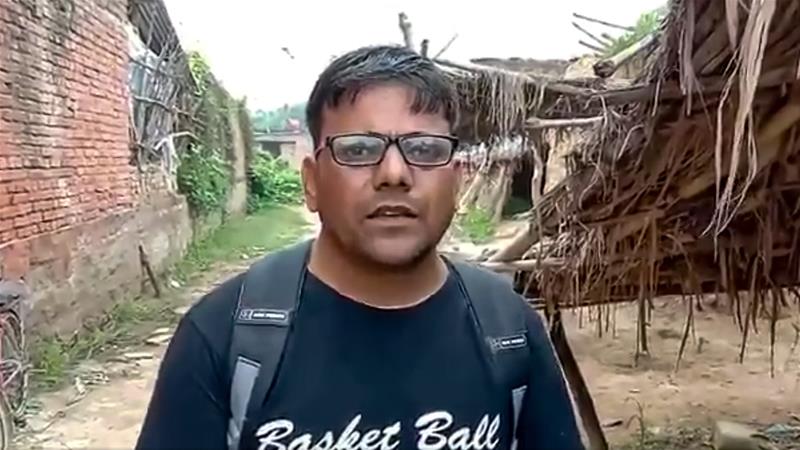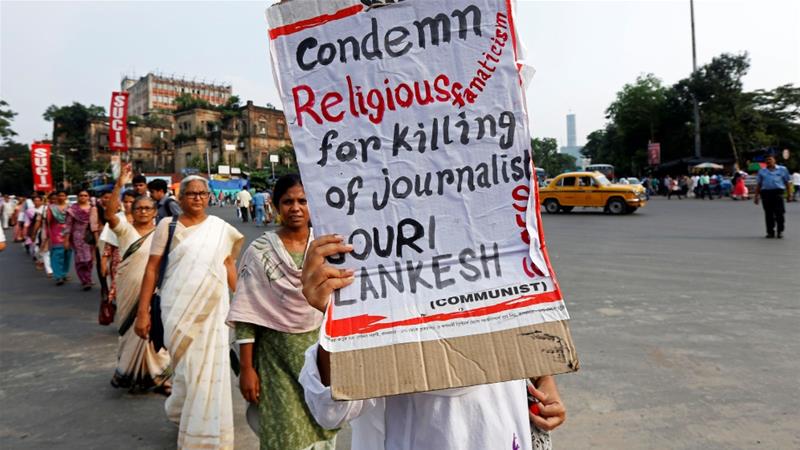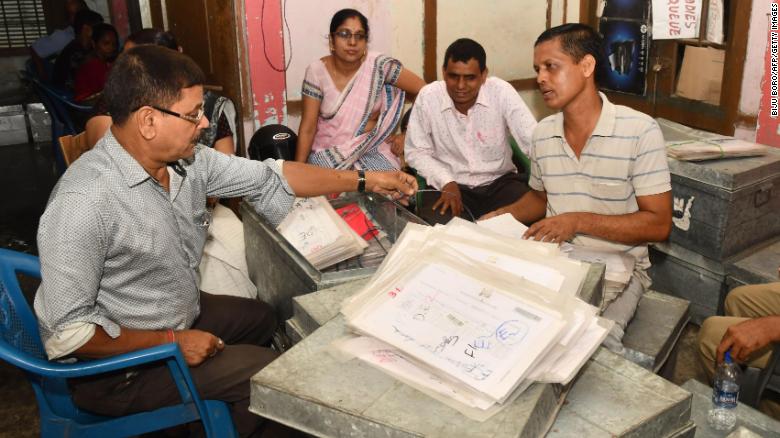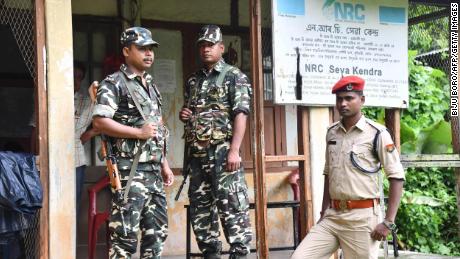Article 15 of
prohibits discrimination based on religion. Human rights groups are lobbying for the creation of a specific hate crimes law, but none exists in India yet.
"It's like they are trying to erase us"
One of India's most infamous recent lynching cases was that of Pehlu Khan, 55, a Muslim dairy farmer from Haryana state.
In April 2017, Khan and his two sons were driving home from a cattle fair in neighboring Rajasthan, with two cows and two calves in the back of their truck, when strangers on motorcycles surrounded them.
"I showed them receipts for the cows we'd bought, but they tore them up — and started beating us with hockey sticks," says Khan's son Mohamed Irshad, 27. "I suffered internal bleeding. My brother and I barely survived — and all of India saw what happened to our father."
That's because the attackers themselves recorded a video of their assault and posted it on social media. In a two-minute clip, the men praise Hindu gods as they punch and kick Khan. His white tunic splattered with blood, the father of eight pleads for his life, calling his attackers "brother."
That graphic video is how Khan's widow Jaibuna, who goes by one name, learned of her husband's death. She was waiting for him to return home from the cattle fair when a neighbor ran up and showed her the clip on his cell phone.
"People were saying, 'Don't show her, this is her family!'" recalls Jaibuna, who is in her mid-40s but doesn't know her exact age. "Everyone was panicking, and I couldn't take it. I fainted."
Before he died, Khan was able to describe his attackers to police. Six men were arrested. Charges against them were dropped, then reinstated, and the case remained in limbo for two years — until last week, when a
, citing lack of evidence.
Instead, Khan was
with cow smuggling. Police say he didn't have a permit to transport cows across state lines. Khan's two sons, who were with him that day, await trial — and if convicted,
.
"It's like they are trying to erase us — erase all of my people," Jaibuna says in the muddy courtyard of their family farm.
The family has sold off their cattle, to avoid further attacks. They're frightened. A sole buffalo remains on their farm, along with some chickens.
Former BJP lawmaker Gyan Dev Ahuja, who represented the Rajasthan district where Khan was murdered,
he has "no regret over his death." He called Khan a "sinner."
A lack of public outcry
Videos of religiously motivated attacks in India like the one that killed Khan continue to go viral. There's a new clip on social media practically every week.
But prosecutions — of the attackers, at least — are rare. So is public outrage.
"How does a majority stay silent and witness something, unless you believe that what's happening is the right thing?" asks author Rana Ayyub, who went undercover to
about the BJP's role in anti-Muslim riots in Modi's home state of Gujarat, where Modi served as chief minister before becoming prime minister.
The lack of public outcry over the surge in lynchings shows that India's Hindu majority tacitly supports not murder, Ayyub says, but some discrimination against Muslims.
Some Indian analysts say the situation in India is comparable to the post-Civil War period in the United States, when many white people looked on as black people were lynched.
"The similarities with the American lynchings of the late 19th century are striking," says
, a business professor at the Indian Institute of Technology Bombay who has studied corporate India's lack of response to hate crimes.
"Most of the upper-middle class that populate the corporate classes, they're also upper-caste Hindus," Poruthiyil explains. "Even if they don't agree with the lynching itself, they might be OK with the idea of stopping cow slaughter. It's a slippery slope."
As a child in Mumbai, Ayyub survived Hindu-Muslim riots in 1992 and 1993, which killed several hundred people. But she says what's happening now feels worse, because it's not a "spur of the moment" outpouring of anger. There are very specific targets.
"Now lynchings are organized on social media," Ayyub says. "People send messages to each other, saying, 'Hey, this household has beef in their fridge, let's go attack them."
She says India's Muslims increasingly perceive such attacks as being against them, rather than in defense of cows and Hindu customs. The repercussions could be dangerous, Ayyub warns. She's worried that Muslims are being alienated as Hindu nationalists revise mainstream Indian norms along Hindu lines.
Relatives of Mohammad Hashim, a lynching survivor, gather at the family's home in Haryana, India.
Lauren Frayer/NPR
"When you try to stifle a community, when you try to put them down, when you try to make them secondary citizens, their anger will burst on the streets," Ayyub says. "That's how you radicalize people."
Offering help
There is a small, fledgling movement of Indians — Muslims and Hindus — working to fight hate crimes and help victims.
In donated office space in New Delhi, four cellphones are lined up on a desk. When one line is busy, the next one rings. This is the headquarters of a new hate crimes helpline, created by
, a network of volunteers. Organizers say they've received 15,000 phone calls since launching in July.
Callers "are very upset. They are very worried and say, 'We are in a difficult position,'" says dispatcher Jagisha Arora. "One person called me and said, 'I'm at police station right now. Police are refusing to lodge a complaint. They are threatening us.'"
Arora, 26, logs details from each call in an Excel spreadsheet and connects callers to free legal aid in 100 different Indian cities.
But from time to time, she also gets a different type of call — from people who are angry that this helpline even exists.
"Some people call to complain, like, 'Why are you spreading this?' They accuse me and say Muslims are bad," she says, shaking her head.
Fears persist
Hashim, the truck driver, survived his lynching on the highway outside New Delhi. After the attack, he was bedridden for six months with a broken leg and fractured vertebrae.
He can't read or write, so his supervisor at the trucking company — a Hindu — helped him file a police report. Nothing has come of it.
Now it's time for Hashim to get back on the road. He needs to provide for his five children.
"My children say, 'Don't worry about us, Daddy. We can stay poor. We'll eat less. We want you to be safe,'" Hashim says.
They're scared that next time, their father might not come home.










